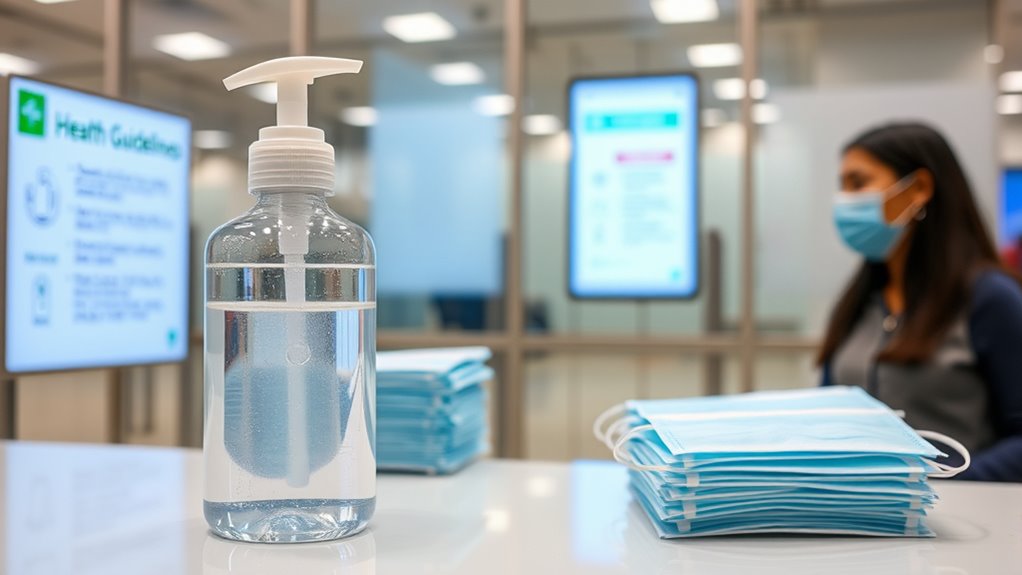To stay prepared for a pandemic, focus on practicing good hygiene by washing your hands regularly with soap or using alcohol-based sanitizer. Isolate quickly if you show symptoms, keeping a safe distance from others and using protective gear when caring for sick people. Rely on trusted sources for accurate information and updates. Mastering these steps helps protect yourself and your community. Keep going to uncover more essential strategies to strengthen your pandemic readiness.
Key Takeaways
- Practice regular handwashing and use hand sanitizer to reduce germ spread.
- Isolate immediately when symptoms appear and follow proper caregiving precautions.
- Maintain social distancing and avoid large gatherings to prevent community transmission.
- Rely on trusted sources like WHO and health authorities for accurate pandemic information.
- Stay informed and adaptable to evolving guidelines to enhance personal and community safety.

Are you prepared for a pandemic? It’s a question that becomes more pressing as global health threats grow more frequent and unpredictable. Being ready isn’t just about having supplies; it’s about understanding how your daily habits and access to information can protect you and your loved ones. One of the most effective ways to safeguard yourself is by practicing good hygiene. Regular handwashing with soap and water for at least 20 seconds removes germs that can cause illness. When soap isn’t available, using hand sanitizer with at least 60% alcohol can serve as a reliable alternative. Avoid touching your face, especially your eyes, nose, and mouth, because these are common entry points for viruses. Cleaning and disinfecting frequently-touched surfaces like doorknobs, light switches, and mobile devices reduces the risk of transmission. Maintaining personal hygiene isn’t just about cleanliness; it’s a fundamental line of defense that helps break the chain of infection. Incorporating proper hygiene practices into your daily routine can significantly reduce your risk of illness.
Isolation is another essential aspect of pandemic readiness. When you or someone in your household shows symptoms of illness, it’s imperative to isolate promptly. This means staying in a separate room, using a different bathroom if possible, and minimizing contact with others. Wearing masks when around others can further reduce the spread of airborne particles. If you need to care for someone who is sick, don’t forget to wear appropriate protective gear and wash your hands thoroughly afterward. Establishing a plan for isolation ahead of time ensures you’re prepared if the situation arises. It also involves informing close contacts so they can monitor their health and take precautions. Practicing social distancing by avoiding large gatherings and keeping a safe distance from others in public spaces lowers the chance of catching or spreading the virus. Being proactive about isolation and distancing helps flatten the curve and protects vulnerable populations.
Reliable information is essential to navigate a pandemic effectively. Misinformation can cause panic, lead to poor decisions, or result in unnecessary shortages. To stay informed, rely on trusted sources such as the World Health Organization, your local health department, and reputable news outlets. Avoid sharing unverified rumors or sensational headlines. Instead, verify facts before acting on them, and follow official guidance on testing, vaccination, and treatment options. Understanding the latest updates allows you to adjust your behavior accordingly, whether it’s wearing masks, practicing hygiene, or getting vaccinated. Having accurate information also helps you communicate effectively with friends and family, spreading awareness and encouraging responsible actions. In a crisis, knowledge is power—arming yourself with reliable info ensures you make sound decisions that keep you and your community safe.
Frequently Asked Questions
How Can I Boost My Immune System Effectively?
To boost your immune system effectively, focus on eating a balanced diet rich in fruits, vegetables, and whole grains. Stay physically active regularly, get enough sleep, and manage stress levels. Keep hydrated and wash your hands often to prevent infections. Consider taking supplements like vitamin C and D if needed. Avoid smoking and excessive alcohol, as they weaken immunity. Consistency in these habits helps strengthen your body’s defenses over time.
What Are the Best Ways to Disinfect Electronic Devices?
You can disinfect your electronic devices effectively by turning off and unplugging them first. Use a soft microfiber cloth dampened with 70% isopropyl alcohol or a manufacturer-approved disinfectant. Gently wipe all surfaces, avoiding excess moisture and openings. For screens, consider using screen-safe wipes. Avoid harsh chemicals like bleach and avoid spraying liquids directly onto devices. Regular cleaning helps reduce germs without risking damage.
How Do I Identify Credible Health Information Sources?
To identify credible health information sources, look for reputable organizations like the CDC, WHO, or your local health department. Check if the website has a clear author, recent updates, and references to scientific studies. Avoid sources that promote sensational claims or lack transparency. Trust peer-reviewed journals and official government sites over social media or unverified blogs. Always cross-check information with multiple trusted sources before acting on it.
What Mental Health Strategies Help During Prolonged Isolation?
During prolonged isolation, practicing mindfulness helps you stay grounded. Imagine Sarah, who started daily meditation during lockdown, noticing her anxiety decrease and mood brighten. You can try deep breathing exercises, meditation, or journaling each day. Stay connected virtually with loved ones, maintain routines, and set small goals. These strategies can boost your resilience, reduce feelings of loneliness, and help you navigate the emotional challenges of extended isolation effectively.
How Should I Handle Conflicting Health Advice From Different Sources?
When you encounter conflicting health advice, trust reputable sources like government health agencies or medical professionals. Cross-check information from multiple credible sources before making decisions. If you’re unsure, consult your healthcare provider for personalized guidance. Avoid jumping to conclusions based on sensational headlines or social media posts. Staying informed through reliable channels helps you make safe, informed choices and reduces confusion during uncertain times.
Conclusion
By staying vigilant with good hygiene, practicing isolation when needed, and trusting reliable sources, you become a sturdy shield against pandemics. Think of your efforts as the steady drumbeat that keeps chaos at bay. When everyone plays their part, the rhythm of community resilience grows stronger, turning chaos into calm. Remember, your actions are the compass guiding us through uncertain times—stay prepared, stay safe, and let your efforts lead the way.










